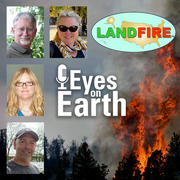Eyes on Earth Episode 114 – The Color of Water with Landsat
Eyes on Earth Episode 114 – The Color of Water with LandsatTypically, we use Landsat data to study changes on the land—you know, Landsat. In this episode of Eyes on Earth, we learn how satellite images and pixels of water, along with actual water samples, are helpful in determining the productivity of lakes across the United States. We talk with Mendenhall Fellow and Research Geographer Dr.








































